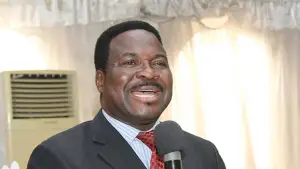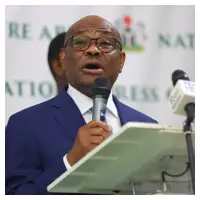Former Jigawa State Governor and ex-National Secretary of the defunct Social Democratic Party (SDP), Sule Lamido, has made a startling revelation about Nigeria's political history in his newly launched autobiography.
In his book titled "Being True to Myself," launched on May 13, Lamido disclosed that he and the late former Kano State Governor, Abubakar Rimi, rejected a N160 million bribe offered by the late Abba Kyari in 1999.
According to Lamido, the bribe was intended to secure their support for Olusegun Obasanjo's vice-presidential candidacy during the formative days of the Peoples Democratic Party (PDP) and the build-up to the 1999 general elections.
In Chapter 9 of his autobiography, titled "Abdulsalami's Transition and Formation of the PDP," Lamido recounted how Abba Kyari—who later became Chief of Staff to President Muhammadu Buhari—approached him and Rimi with a young associate. They presented a bank draft of N160 million as a "contribution" to support Kyari's ambition to become Obasanjo's running mate.
"The young man greeted me with the traditional salutation 'Ranka ya dade, Sule!' and introduced Abba Kyari, stating he wanted to be Obasanjo's running mate on the PDP platform. He said Kyari had brought a bank draft of N160 million to support the party's campaign expenses," Lamido wrote.
Lamido further detailed their reaction to the offer: "Rimi and I were stunned. I reacted angrily, asking if they were trying to buy us. 'So, you are giving us N160 million for Kyari—whom we don't even know—to become vice president? You aren't serious. You idiot!' They left, clearly embarrassed."
The former governor explained that the offer was based on the assumption that he and Rimi held significant influence in the vice-presidential selection process, which at the time also considered other prominent figures including Jibril Aminu, Adamu Ciroma, and Rimi himself.
This revelation provides a rare glimpse into the political maneuvering that characterized the PDP's formation and the critical decisions that shaped Nigeria's return to civilian rule in 1999 after years of military dictatorship.
Lamido's autobiography, which was unveiled earlier this month, contains several other political insights and personal reflections from his decades-long career in Nigerian politics.













